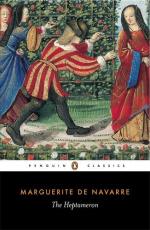The Lady Oisille replied that she had been at pains to forget every description of worldly vanity, and she therefore feared that she should succeed but ill in the choice of such an entertainment. The matter must be decided by the majority of opinions, and she begged Hircan to set forth his own first.
“For my part,” said he, “if I thought that the pastime I should choose would be as agreeable to the company as to myself, my opinion would soon be given. For the present, however, I withhold it, and will abide by what the rest shall say.”
His wife Parlamente, thinking he referred to her, began to blush, and, half in anger and half laughing, replied—
“Perhaps, Hircan, she who you think would find it most dull might readily find means of compensation had she a mind for it. But let us leave aside a pastime in which only two can share, and speak of one that shall be common to all.”
“Since my wife has understood the meaning of my words so well,” said Hircan to all the ladies, “and a private pastime is not to her liking, I think she will be better able than any one else to name one that all may enjoy; and I herewith give in to her opinion, having no other of my own.”
To this all the company agreed.
Parlamente, perceiving that it had fallen to her to decide, spoke as follows—
“Did I find myself as capable as the ancients who invented the arts, I should devise some sport or pastime in fulfilment of the charge you lay upon me. But knowing as I do my knowledge and capacity, which are scarcely able to recall the worthy performances of others, I shall think myself happy if I can follow closely such as have already satisfied your request. Among the rest, I think there is not one of you who has not read the Hundred Tales of Boccaccio, (11) lately translated from the Italian into French. So highly were these thought of by King Francis, first of that name, Monseigneur the Dauphin, (12) Madame the Dauphiness, and Madame Margaret, that could Boccaccio have only heard them from the place where he lay, the praise of such illustrious persons would have raised him from the dead.
11 Margaret here alludes to the French translation of the Decameron made by her secretary, Anthony le Macon, and first issued in Paris in 1545. Messrs. De Lincy and Montaiglon accordingly think that the prologue of the Heptameron was written subsequently to that date; but M. Dillaye states that Le Macon’s translation was circulated at Court in manuscript long before it was printed. This contention is in some measure borne out by Le Macon’s dedication to Margaret, of which the more interesting passages are given in the Appendix to this volume (A).—ED.
12 The Dauphin here mentioned is Francis I.’s second son, who subsequently reigned as Henry II. He became Dauphin by the death of his elder brother on August 10, 1536. The Dauphiness is Catherine de’ Medici, the




